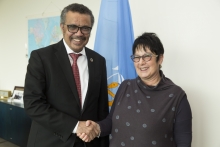PSI admitted into Official Relations with WHO

The Plan of Collaboration jointly formulated by WHO and PSI within the context of the WHO framework of engagement with non-state actors (FENSA) for the 2018-2020 period, was equally endorsed by the WHO Executive Board. It focuses on the “Working for Health” Five-Year Action Plan for Health Employment and Inclusive Economic Growth (2017-2022) discussed and adopted at the 70th World Health Assembly last May.
On 8 February, Rosa Pavanelli, PSI General Secretary, met with Dr Tedros Adhanom Ghebreyesus, Director-General of the World Health Organization, at the WHO headquarters. She expressed PSI’s appreciation of the establishment of this new form of relations between both organisations.
Dr Ghebreyesus stated that WHO is looking forward to working with PSI “to expand and transform the global health workforce.” The formal relations now instituted will enable health workers organised as trade unions to better contribute to the policy process in international health. PSI can now participate and intervene, within the decision-making structures of the WHO, internationally and regionally.
PSI and its affiliates will utilise this ground-breaking development to ensure that concerns of health workers and defence of public health continue to be pivotal issues in the policy process worldwide, towards a better world with quality health for all.
During her visit to the WHO, the PSI General Secretary gave a clear indication on this when she stressed the need for increased public funding of health. It is only the public health system, she said, that can guarantee universal health care, since private providers are guided by for-profit motives.
She also noted that a vibrant atmosphere of social dialogue is necessary for harmonious labour relations. When unions’ right to organise and collective bargaining is not respected, conflicts which could hinder the delivery of health services are likely to arise. This becomes particularly calamitous during health emergencies as evidenced by developments in Liberia during the Ebola outbreak, because of the government’s violation of health workers' trade and labour rights.
Dr Ghebreyesus agreed with the PSI General Secretary that emphasis must be placed on ensuring the safety and security of health workers, as the world needs them to be living heroes, saving lives and making the world better. He also stressed the importance of addressing health worker migration in a mutually beneficial way for all countries.
The Director-General then assured Rosa Pavanelli of WHO’s commitment to working closely with PSI at the international and regional levels of its work.

